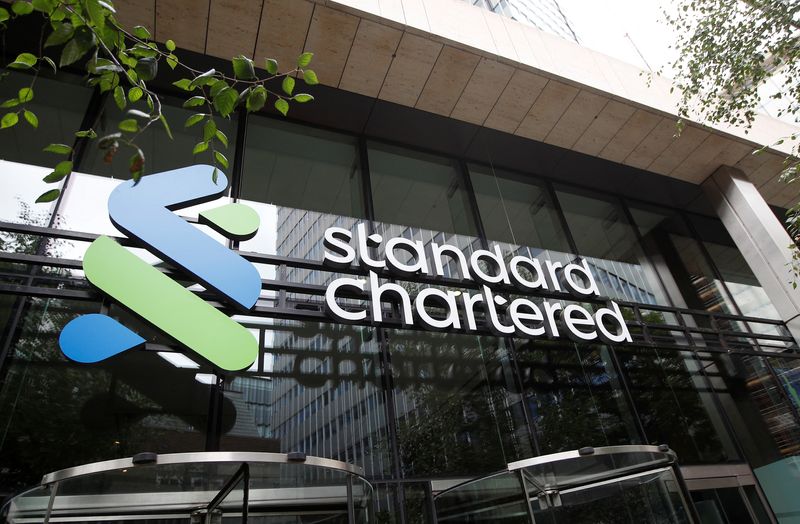By Selena Li and Lawrence White
HONG KONG/LONDON (Reuters) -Standard Chartered PLC Chief Executive Bill Winters on Friday bluntly acknowledged the bank's underwhelming share price and vowed to fix it as the lender announced increased dividends, a fresh $1 billion buyback and an 18% increase in annual profit.
"The share price is crap. I know that's going to be a quote," Winters told reporters on a conference call in response to questions about the lender's valuation, which has fallen 4% in the year to date and 16% in the last 12 months.
Winters said the lender's market valuation does not reflect its performance based on historical returns for the sector, blaming a number of factors.
Some shareholders say the bank's costs are too high relative to its income, he added, with offices in too many underperforming economies, and its complex business model makes it more challenging for plans to be delivered.
StanChart shares jumped 8.2% in London in early trading, having risen 2% in Hong Kong earlier.
The chief executive's remarks show the intense pressure the CEO is under to take more aggressive action to improve returns at the bank after nearly 9 years at the helm, during which its share price has fallen around 35%.
"We will be completely focused on addressing shareholders' concerns because we are completely optimistic about our delivery," he said.
Winters saw his total pay package rise to 7.8 million pounds ($9.88 million) from 6.4 million pounds the year before, as long-term incentive awards performed well, while the group bonus pool for staff shrank 1% to $1.6 billion.
CHINA IMPAIRMENTS
Efforts by the bank to regain investor confidence have become trickier as China's economy - a market which the lender has pinned much hope on becoming a strong growth engine - has sputtered in recent years.
Writedowns on real estate and bank sector exposure marred growth in revenue from wealth and other China-related businesses.
The bank's China onshore income grew only 4% last year, compared with 42% growth in offshore-related income.
"The stark performance difference between onshore and offshore business in China highlights the challenging domestic environment," said Matt Britzman, equity analyst at Hargreaves Lansdown (LON:HRGV) in a note to clients.
The Asia-focused lender took a $850 million impairment mainly from its stake in Chinese lender Bohai Bank, its second time writing down the value of the unit as the lender was hit by increasing bad loans as growth in the world's second-largest economy stumbled.
Its hefty loss in China, a core target for StanChart's strategy, underlines the challenge it faces to expand in the country as policymakers struggle to arrest a deepening property crisis and revive weak consumer confidence.
A fresh $150 million fourth-quarter writedown of its stake in Bohai Bank, following a $700 million hit earlier in 2023, reduced its value to $700 million from $1.5 billion.
As well as hurting the value of StanChart's investment in Bohai Bank, China's real estate woes also hit the British bank directly as it took a further $282 million provision on expected loan losses relating to the ailing sector.
That brought total provisions for its China real estate exposure to $1.2 billion in the last 3 years.
"As our business migrates and evolves away from any commercial real estate involvement at all, the rest (of the China onshore business) is growing quite nicely," Winters said during the call, adding growth of its non-real estate business was expected to accelerate.
HSBC Holdings (LON:HSBA) on Wednesday reported a shock $3 billion charge on its stake in a Chinese bank, the largest yet by an overseas lender, amid mounting bad loans in the country, sending the British bank's shares plunging and taking the shine off its record annual profit.
StanChart said banking industry challenges and the uncertainty swirling around the property market were to blame for the decline in the stake's current value.
WEAKER OUTLOOK, SHAREHOLDER REWARDS
With the outlook for China likely a major concern, StanChart set out restrained new guidance after reporting statutory pretax profit in 2023 rose to $5.09 billion, in line with forecasts, and announced a jump in dividends alongside the buyback.
The bank said it expected income to grow at the higher end of 5-7% in 2024, lower than the previous estimate of 8-10% given last October. The lender booked 13% income growth in 2023 in constant currency terms.
Still, StanChart said it would aim to increase returns on tangible equity, a key profitability metric, "steadily" from the current 10% to 12% by 2026, abandoning a previous forecast to hit 11% this year.
The London-headquartered lender also announced a final dividend of $560 million or 21 cents per share, resulting in a 50% increase of its full-year dividend payout to 27 cents, greater than a consensus view of 23.7 cents.
The bumper investor payouts but muted performance outlook from StanChart followed a trend set by European peers including Barclays (LON:BARC), Deutsche Bank (ETR:DBKGn), and HSBC, as they opt to return more cash to shareholders rather than invest in growth in a tougher operating environment.

CEO Winters said in a release that the bank targets to return at least $5 billion over the next three years.
($1 = 0.7898 pounds)